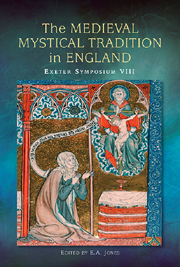 The Medieval Mystical Tradition in England
The Medieval Mystical Tradition in England Book contents
- Frontmatter
- Contents
- Lists of Diagrams and Figures
- List of Contributors
- Abbreviations
- Introduction
- The Colours of Contemplation: Less Light on Julian of Norwich
- Behold Not the Cloud of Experience
- Walter Hilton on the Gift of Interpretation of Scripture
- Numeracy and Number in The Book of Margery Kempe
- Religious Mystical Mothers: Margery Kempe and Caterina Benincasa
- Authority and Exemplarity in Henry Suso and Richard Rolle
- Mortifying the Mind: Asceticism, Mysticism and Oxford, Bodleian Library, MS Douce 114
- The Meditaciones of the Monk of Farne
- Envisioning Reform: A Revelation of Purgatory and Anchoritic Compassioun in the Later Middle Ages
- Walton's Heavenly Boece and the Devout Translation of Transcendence: O Qui Perpetua Pietised
- Reformist Devotional Reading: The Pore Caitif in British Library, MS Harley 2322
- Richard Whytford, The Golden Epistle, and the Mixed Life Audience
- Afterword: Future Prospects
- Index
Behold Not the Cloud of Experience
Published online by Cambridge University Press: 05 July 2013
- Frontmatter
- Contents
- Lists of Diagrams and Figures
- List of Contributors
- Abbreviations
- Introduction
- The Colours of Contemplation: Less Light on Julian of Norwich
- Behold Not the Cloud of Experience
- Walter Hilton on the Gift of Interpretation of Scripture
- Numeracy and Number in The Book of Margery Kempe
- Religious Mystical Mothers: Margery Kempe and Caterina Benincasa
- Authority and Exemplarity in Henry Suso and Richard Rolle
- Mortifying the Mind: Asceticism, Mysticism and Oxford, Bodleian Library, MS Douce 114
- The Meditaciones of the Monk of Farne
- Envisioning Reform: A Revelation of Purgatory and Anchoritic Compassioun in the Later Middle Ages
- Walton's Heavenly Boece and the Devout Translation of Transcendence: O Qui Perpetua Pietised
- Reformist Devotional Reading: The Pore Caitif in British Library, MS Harley 2322
- Richard Whytford, The Golden Epistle, and the Mixed Life Audience
- Afterword: Future Prospects
- Index
Summary
Behold! I have given you every herb … and every tree … and every beast … and every fowl … and every thing that creepeth ….
(Genesis 1: 29-30)Behold! I have seen the suffering of my people.
(Exodus 3: 7)Behold! I am laying in Zion a foundation stone.
(Isaiah 28: 16)Behold! I am sending my messenger.
(Malachi 3: 1)Behold! the bridegroom comes.
(Matthew 25: 6)Behold! You shall conceive.
(Luke 1: 31)Behold! I bring you good tidings.
(Luke 2: 10)Behold! the Lamb of God.
(John 1: 29)Behold! the hour comes.
(John 16: 32)Behold! I show you a mystery.
(I Corinthians 15: 51)Behold! he is coming with the clouds and everyone shall see him.
(Revelation 1: 7)Behold! the Lion of Judah.
(Revelation 5: 5)Behold! the tabernacle of God is within you.
(Revelation 21: 3)The argument of this paper is that recovering the biblical word behold and the work of silence - the model of the mind - it entails is crucial to understanding ancient, patristic and medieval texts. The word behold is a liminal word; it signals the threshold of contemplation, where the self-conscious mind stops analysing and becomes attentively receptive, open in an ungrasping and self-emptying way to irruption from the deep mind. Examples of this process will be drawn from Richard of St Victor's Mystical Ark, The Cloud of Unknowing and Julian's Long Text.
- Type
- Chapter
- Information
- The Medieval Mystical Tradition in EnglandPapers Read at Charney Manor, July 2011 [Exeter Symposium 8], pp. 29 - 50Publisher: Boydell & BrewerPrint publication year: 2013
